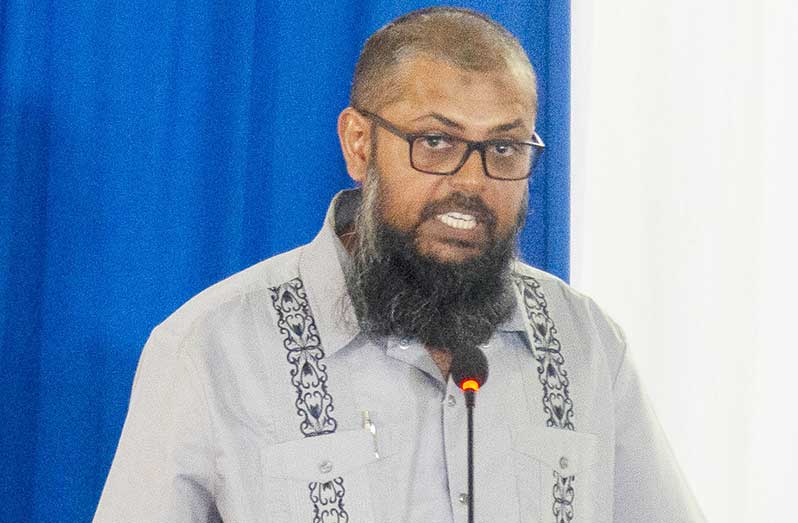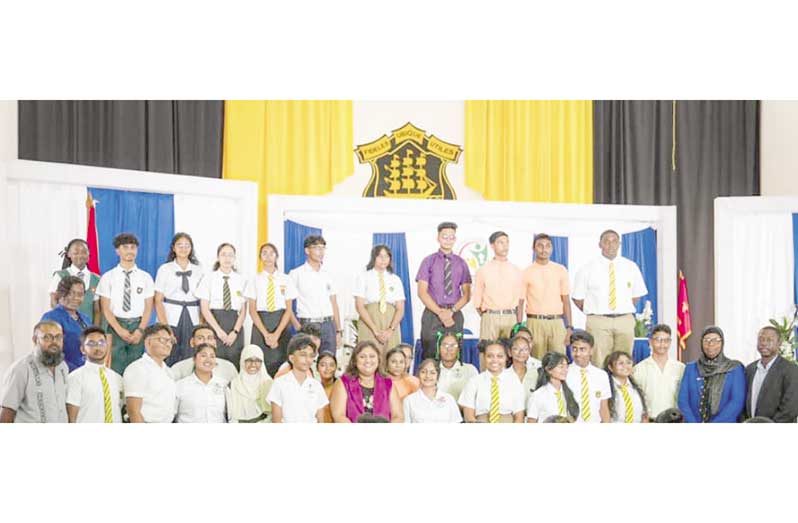–despite teachers strike at the most crucial times of preparation for students
–aggressive plans in place to target weak subject areas, Education Minister affirms
BASED on preliminary results from the Caribbean Examination Council (CXC), the Ministry of Education has reported that mixed results were recorded for this year’s Caribbean Secondary Education Certificate (CSEC) examinations and Caribbean Advanced Proficiency Exam (CAPE).
This was highlighted by Chief Education Officer (CEO) Saddam Hussain during his presentation of those results at a ceremony held at the Queen’s College Auditorium.
According to Hussain, for CAPE this year, 721 students wrote various units from 13 secondary schools and four private centres across the country, as compared to last year when 701 candidates wrote the exams.
The overall pass rate, which means students attaining between Grades One to Five at CAPE, is 92.57 per cent, which is seen as stable, since last year’s pass rate stood at 93 per cent.

In terms of CSEC, Hussain said a total of 11,612 students wrote the exams; this represents a slight reduction from the 12,108 students in 2023.
He said that an analysis of the 2024 preliminary results has revealed that the overall pass rate for CSEC is 67.23 per cent, while it was 67.34 last year.

“We recorded improved performances in 12 subjects, while seven subjects remained constant; it did not change. Outstanding performances were recorded in seven subjects, where 90 per cent of the students gained Grades One to Three,” Hussain said.
However, percentage decreases were seen in the two most important subject areas, namely English Language and Mathematics. In English, there was a decline from 72 per cent to 69 per cent in the pass rate, while Mathematics recorded a pass rate of 31 per cent.
Referencing areas where outstanding performances were recorded, Hussain said: “Agriculture Science, the double award with 98.85 per cent; Electronic Document Preparation and Management (EDPM) with 93.1 per cent; Theatre Arts with 98.98 per cent; and one that is close to my heart, family and resource management with 91.18 per cent.”
INTERVENTION
Minister of Education Priya Manickchand, in her remarks, said a teachers strike occurred at one of the most crucial times in the children’s preparation for these exams.
“I’m really pleased to say that even with that harshness and shock in the system, we did not, because of measures the ministry took to lessen the impact of that strike, we didn’t do as badly as someone sitting objectively trying to analyse pre-results what we would have done,” she said.
Against this backdrop, Manickchand added that while Guyana dropped in Mathematics by three percentage points, the Caribbean, overall, dropped by seven.
The Education Minister told the gathering that the ministry is set to roll out an aggressive Mathematics intervention to ascertain where the problem lies, and work along with schools, while also ensuring that students are provided with all the necessary equipment and tools.
She said that they have looked at schools that have been recording lower grades in Mathematics, and with that, will launch monitoring in some 50 of those schools to ensure that teachers are teaching topics, and students are understanding them.
“So, we are doing 50 of those schools where there will be monitors going into those schools to make sure teachers are teaching the topics and children are understanding those topics, so that next year we won’t have space to hold children here for 14 and more Grade Ones. And I firmly believe this is going to produce better results,” Minister Manickchand said.



.jpg)








